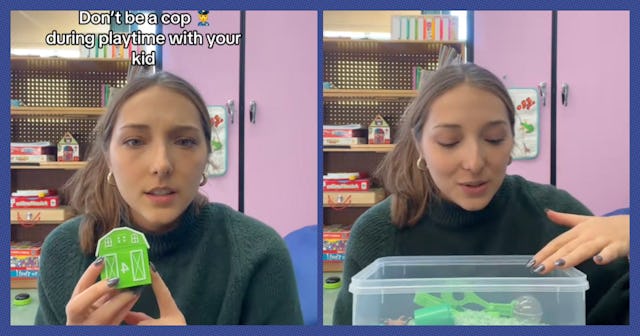This Pediatric Speech & Language Pathologist Urges Parents: “Don’t Be A Cop During Playtime”
Kids remember things better when it’s fun!

Playing with babies and toddlers can be hard. Their brains, respectfully, are soup. No shade! They’re supposed to have a big ol’ bowl of lukewarm chowder up there — everything is still squishy and growing, and they have to learn literally everything.
Of course, as their parents, we want to help educate them about the basics like colors, shapes, and all that. But pediatric speech and language pathologist Nicole Druckman, who posts on TikTok as @speecheasy has some advice: don’t be a cop during playtime with your kids.
What does that mean, exactly? Well, specifically don’t interrogate your children during games.
Questions like “What color is this toy?”,“What number is on this card?”, “What’s inside this box?”, and “What toy is this?” should be avoided at all costs.
“That’s not supposed to be what play looks like with your toddler,” Druckman explains. Fortunately, she has some examples of what you can do to help your kiddo learn and have fun during playtime.
In her first example, she highlights how you can teach your child about color. She starts with a simple, monochromatic (green) sensory bin.
“Instead of quizzing ‘what color is this? what color is this?’ and presenting all the colors at the same time and trying to get them to memorize it right then and there, you can just make a green sensory bin.”
And then, instead of asking the child what color everything is (though the question would be made easier by the fact that there’s only one color to deal with), you just make declarations about what you see. Like “Wow! Green rice! Green bear! Green cup!”
It’s giving Ms. Rachel, and we’re here for it.
Once you get the color down, you can go around your house and check out other green things.
“Make it really concrete for your kid,” she advises. “Kids remember things better when it’s fun, when it’s child-led, and when it’s concrete.”
It’s a subtle mindset shift that can make a big difference. There is so much about parenting that it is really hard to learn, change, or apply in your daily life, but this feels refreshingly doable. As many parents in the comments point out, we naturally default to a kind of “good cop” barrage of questions instead of modeling behavior with our kids.
Druckman assures one commenter that if your kid enjoys the kind of play that would fit right in an interrogation room or on a quiz show, that’s great. But not all kids do, “especially if they’re not sure,” in which case this provides an excellent opportunity to engage with your child in a way that might be more fun and educational for them.